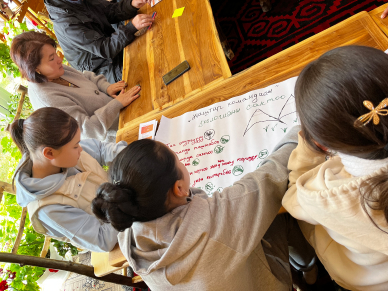Is it possible to have tourism that preserves nature and brings income to rural residents?

Composting organic waste, beekeeping, recycling, saving water and energy, growing natural products – these are all steps that local residents of Chong-Kemin and the southern shore of Lake Ysyk-Kol plan to implement in their guest houses.
During interactive ecotourism trainings, local communities develop integrated approaches to managing guest houses, combining environmental solutions and sustainable development.
What does an integrated approach provide?
Ecotourism development is more than just accommodating tourists. It is the introduction of practices for the careful use of resources.
The main advantages of this approach:
– Composting organic waste
Processing organic waste into compost will enrich the soil, improving crop yields.
– Beekeeping on the site
Breeding bees will help pollinate plants, which increases crop yields by up to 30%. And natural honey can be offered to your guests.
-Waste recycling
Waste recycling will help keep the area clean, attracting environmentally conscious tourists.
-Sheep wool recycling
The wool of sheep grazing on pastures can be processed into felt souvenirs, which will create additional income for local residents.
-Water and energy saving
Rational use of water and its purification will ensure long-term sustainability and protect natural resources.
-Growing organic products
Growing organic products will not only improve the soil, but also increase the value of the guest house for travelers.
-Eco-camps for children
Organizing eco-camps will help raise the younger generation with an understanding of the importance of protecting the environment.
The project “Empowering Women in Kyrgyzstan through Ecotourism” is implemented with the support of the Canadian Foundation for Local Initiatives (CFLI)

